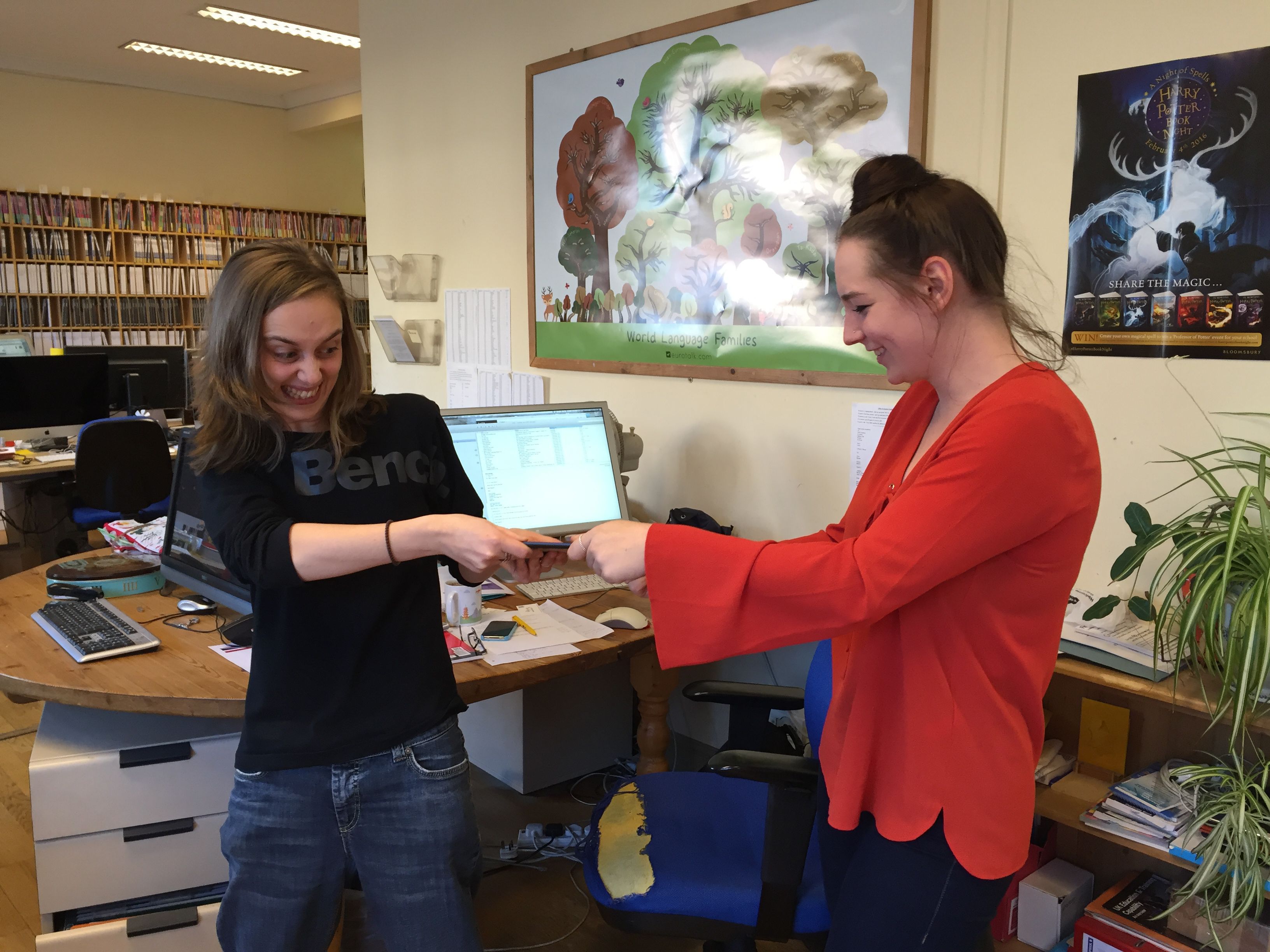#uTalkChallenge 2016: which language will you learn?
The uTalk Challenge is almost here!
From January 1st, start a new language for free, and learn as much as you can with our uTalk app by January 31st.
The uTalk challenge is open to everyone and totally free, so if you’d like to join in, you can find more details and sign up to the challenge here: eurotalk.com/utalkchallenge
With 130 languages to choose from (we’ve just added Greenlandic and Indian English to the app, so there’s now even more choice!), there’s something for everyone – and we’re certainly covering a variety of languages here in the EuroTalk office, where competition is bound to be fierce…
Safia – Mandarin Chinese
My mum and little sister despair at my lack of ability to speak any Mandarin so it’s probably about time to rectify the situation. And then they can’t gang up on me anymore when we play Mahjong!
Alex – Turkish
My best friend and her twin sister at uni are Turkish Cypriot, and they always speak Turkish between the two of them when they’re with us, so I want to be able to understand who or what they’re talking about.
Nat – Welsh
I always intended to move to Wales one day so thought I should learn a bit of the language – plus I’m interested to see how much my (limited) Cornish will help with Welsh!
Ioana – Argentinian Spanish
I want to be able to chat with the lovely non-English speaking relatives of my boyfriend, and also to unexpectedly add Spanish words to our daily conversations.
Adi – Arabic
I lived in Dubai for six years, and I hardly know any Arabic, so it’s high time.
Liz – Welsh
No particular reason, if I’m honest; I just fancy a challenge! I think trying to say Llanfairpwllgwyngyllgogerychwyrndrobwllllantysiliogogogoch whet my appetite…
Steve – Scots Gaelic
Scotland is one of my favourite places in the UK and I’d like to learn a Celtic language which is still spoken there.
Simon – Polish
It’s the second most common language spoken in the UK. It’s very different from anything I’ve learnt before, and would be interested to try and pick up a few words and sentences and then try and see if I can hear them in real life!
Brett – Arabic
I have been to the UAE on a couple of occasions this year. I am going again next year to meet some schools who need a solution to help get their English-speaking students to speak Arabic. If I’m trying to help them, then I should really learn it too.
Pablo – Romanian
My girlfriend is from Romania. I’ll try to be able to say something else other than her name and ‘da’.
Which language will you learn?
PS No EuroTalkers were harmed in the making of this blog post.
Fancy a cuppa? Got time for a brew?
Travel around the UK a bit and you’ll find that tea is not just known as ‘tea’: so ubiquitous is it that there are plenty of regional and affectionate names for our favourite drink. A cuppa, a brew, a cup of char, a Rosy Lee (Cockney rhyming slang), a builder’s will all get you the same thing: a nice cup of steaming hot, milky tea. Lovely!
Tea is so important to us that it’s even filtered into our everyday language and is integral to some of our common idioms. Here are a few examples:
Not for all the tea in China!
You want me to do what?? Not for all the tea in China! Essentially meaning that you wouldn’t do something, no matter how good the reward.
It’s not my cup of tea.
Are you enjoying this programme? Not really- it’s not my cup of tea. Very simply, if something’s not your cup of tea, you don’t like it.
As useful as a chocolate teapot.
Fairly self-explanatory: not useful in the slightest.
Tea and sympathy
If someone’s upset, you might give them tea and sympathy (a nice strong cup of hot tea offering, of course, immeasurable comfort).
Tea leaf
Oy! That tea leaf’s ‘alf-inched me wallet! In Cockney rhyming slang, a tea leaf is a thief! (And, in case you’re wondering, to half inch is to pinch.)
Can you think of anymore tea idioms? Lets us know on Twitter or Facebook.
The uTalk Challenge 2016: New Year, New Language
Quit smoking. Learn Welsh. Finally finish writing that book – and actually let someone read it. Learn Thai. Spend more time sailing. Learn Mandarin. Walk the street map of London. Learn Turkish. Achieve a freestanding handstand and a scorpion/needle stretch (whatever that is). Learn Argentinian Spanish.
These are just a few of the New Year’s resolutions we’ve been setting ourselves in the EuroTalk office, having just realised 2016 has crept up on us and is suddenly, terrifyingly close. And you may have noticed a bit of a language theme…
Introducing the uTalk challenge 2016 – learn a language for free this New Year
That’s because this January, we’ll be taking on the uTalk challenge 2016, using our uTalk app to learn as much as we can of our chosen language before 31st January. Last year Nat stormed to victory in our first uTalk challenge, completing the app in Icelandic before most of us had even mastered ‘hello’… but we’re hoping for a closer contest this time around. And failing that, our back-up plan is to steal her iPad.
How to join the uTalk challenge
But we don’t want to do it alone! So if you’re an iOS user*, and you’d like to finally start learning that language you’ve been talking about for ages, now’s your chance. And even better, the uTalk challenge is completely FREE. All you need to do is sign up at eurotalk.com/utalkchallenge, and on January 1st we’ll send you over a code to unlock the Essentials upgrade (worth £7.99) for your chosen language. Then it’s over to you…
We’ll check in with you each week by email to see how you’re doing and update the online leaderboard, so you can see how your score compares to everyone else’s. AND if you complete the Essentials by the end of January, we’ll give you another language to learn in February, and so on. So if you’re really determined, you could learn 12 new languages in 2016. Now that’s a pretty cool New Year’s resolution.
*Unfortunately the uTalk app is only available on iOS, we’re really sorry! But we don’t want anyone to miss out, so if you’re not an iOS-er and you’d like to take part, drop us an email to challenge@eurotalk.com and we’ll see if we can work out an alternative for you.
Spread the word
Challenges are a lot more fun if you’ve got company, so please help us spread the word to friends and family using the link eurotalk.com/utalkchallenge and on social media, using #uTalkChallenge. And for regular video updates from the EuroTalk team, in which we’ll attempt to demonstrate how much we’ve learnt, come and follow us on Facebook and Twitter.
Some of last year’s uTalk Challengers (who we hope will join us again this year!)…
Ingrid, learning Serbian
I’ve really enjoyed doing the challenge. Serbian is a language I’ve wanted to get to grips with for a long time for quite a bizarre reason (it involves a love of the Eurovision Song Contest!) but I haven’t really known where to start.
Patricia, learning Icelandic
The uTalk app is a whole lot of fun, filled with useful words and phrases. I particularly enjoyed repeating the words and phrases after the native speakers and then hearing my own voice. What a great tool to gain confidence and improve pronunciation!
Jacqui, learning Croatian
After a month, I’ve made great progress. I haven’t earned maximum points (I’m on just over 4000), but I have managed to learn a lot more than I thought I would, even waking up some mornings with various phrases springing to mind!
And here’s how the EuroTalkers got on…
So… who’s up for the challenge?
EuroTalk Christmas Countdown starts here!
My countdown to this Christmas started on 26th December 2014; it’s my favourite time of year! I keep an app on my phone all year that counts down the number of sleeps until Christmas is back once again.
When it gets to the 1st of December, it’s traditional in the UK to use an advent calendar to count down the days up to and including Christmas Eve on the 24th. As a child, I was lucky enough to have a calendar with little pockets that my mum would place a chocolate and a little present in; these varied from pencils to hair bands.
We’ll be using my calendar at EuroTalk this year, to reveal a different Christmas word, in a different language, each day. You can countdown with us by following us on Twitter or liking us on Facebook – head on over now to find out what today’s word is, and see if you can pronounce it better than Ioana 😉
The idea of advent calendars originated from Germany, but soon spread across Europe and North America. Advent starts four Sundays before Christmas each year. People used to light a candle and allow it to burn down slightly more each day, representing how long there was until Christmas. Advent then moved onto boards with dates, and each day a different picture would be pinned onto the board. The first printed advent calendar dates back to the early 20th century, but during World War 2 production was stopped, in order to save cardboard and paper.
Advent calendars have become part of our annual Christmas celebrations. Today you can buy a standard calendar, which allows you to open little numbered doors and behind each one find either a picture or a chocolate. Alternatively you can buy ones with a gift behind each window; last year Harrods sold one shaped like a house that contained a different porcelain ornament for each day (we’re not sure how many they sold, though, as it cost £9,600…).
Do you have an advent calendar at home? What did you get for day 1?
Merry Christmas!
Alex







